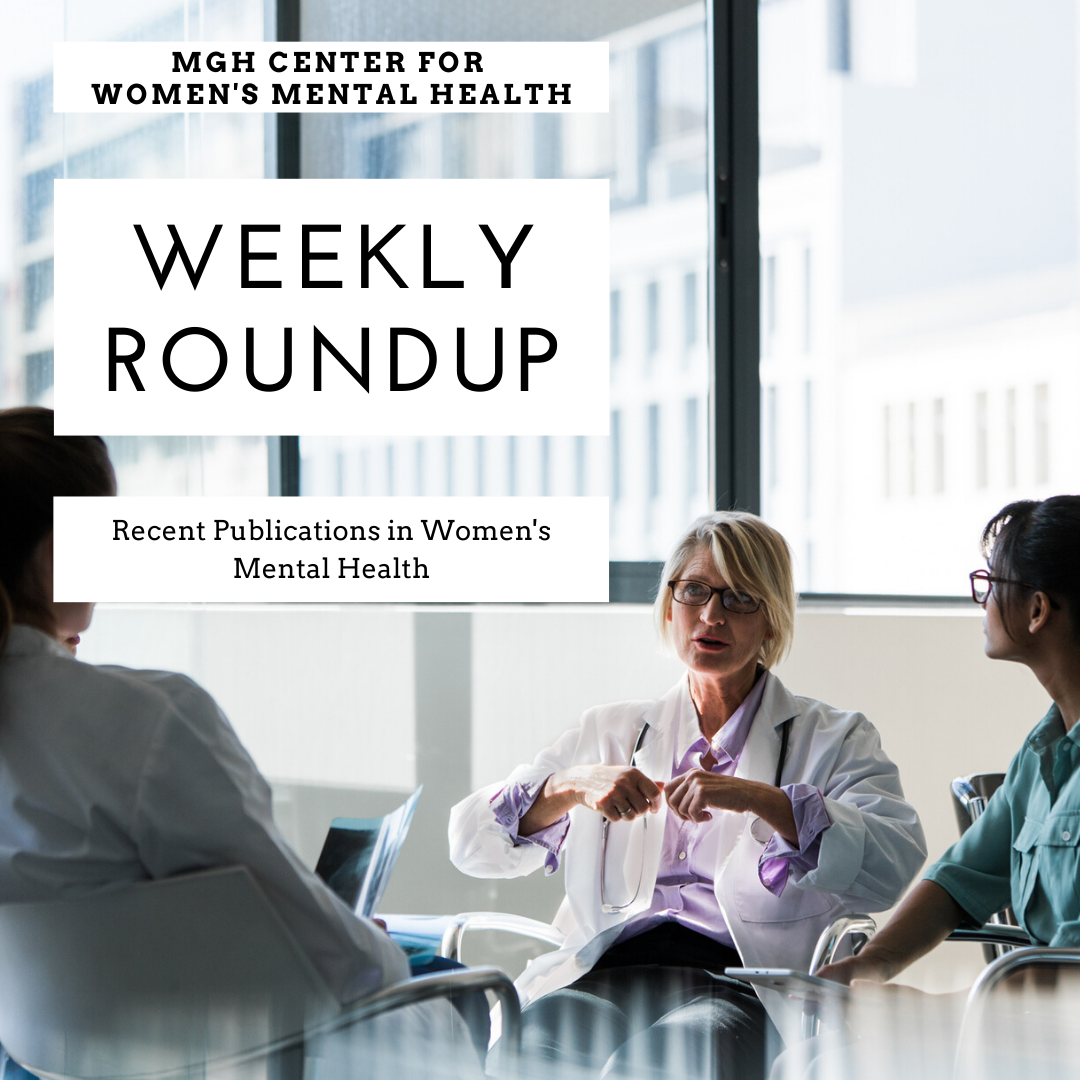
Every week we review the most recent publications in women’s mental health, covering topics related to premenstrual symptoms, perinatal mood and anxiety disorders, use of medications in pregnant and breastfeeding women, perinatal substance use, and menopausal mental health.
For more detailed descriptions of many of these topics, you can sign up to receive our weekly CWMH NEWSLETTER which comes out every Thursday.
And don’t forget to visit ESSENTIAL READS – a curated selection of up-to-date and clinically relevant articles in women’s mental health.
Ruta Nonacs, MD PhD
PMS AND PMDD |
| No articles this week |
INFERTILITY AND MENTAL HEALTH |
| No articles this week |
PSYCHIATRIC ILLNESS DURING PREGNANCY |
| Screening for Perinatal OCD: A Comparison of the DOCS and the EPDS.
Fairbrother N, Albert A, Keeney C, Tchir D, Cameron RB. Assessment. 2021 Dec 30:1 The DOCS total score demonstrated the highest level of accuracy. Neither the EPDS-Full nor the three-item Anxiety subscale of the EPDS (EPDS-3A) met the criteria of a sufficiently accurate screening tool for OCD at any of the assessment points. |
MEDICATIONS AND PREGNANCY |
| No articles this week |
POSTPARTUM PSYCHIATRIC ILLNESS |
| Are Experiences of Racial Discrimination Associated with Postpartum Depressive Symptoms? A Multistate Analysis of Pregnancy Risk Assessment Monitoring System Data.
Weeks F, Zapata J, Rohan A, Green T. J Womens Health (Larchmt). 2021 Dec 30. Being upset by racial discrimination was associated with nearly three times higher odds of PPDS. Among women of color with at least some college education, the higher odds of PPDS associated with racial discrimination were greater than threefold, and for women with less than a high school education were less than twofold. Austin AE, Sokol RL, Rowland C. Ann Epidemiol. 2021 Dec 30:S Medicaid expansion may be associated with a small reduction in the likelihood of postpartum depressive symptoms. The role of psychiatrists in reducing maternal mortality. Bhat A, Wichman C, Mittal L, Byatt N. Gen Hosp Psychiatry. 2021 Jul-Aug;71:145-146. Kennedy E, Munyan K. J Perinatol. 2022 Jan 1. Risk Factors Associated with Postpartum Depressive Symptoms: A Multinational Study. Bradshaw H, Riddle J, Salimgaraev R, Zhaunova L, Payne JL. J Affect Disord. 2021 Dec 31:S Postpartum depressive symptoms (PDS) decreased with advancing age. First-time mothers reported higher rates of PDS. Twin births were associated with a higher symptom burden than singleton births and mothers of twins in the oldest age group reported the greatest burden. There was not a clinically significant difference in rates of PDS between mothers of singleton girls and boys. Screening for Postpartum Depression in a Neonatal Intensive Care Unit. Brownlee MH. Adv Neonatal Care. 2021 Dec 28. The overall EPDS screening compliance was 66% with a positive rate of 26%. Nurses followed the referral algorithm appropriately 100% of the time. It was confirmed that 93% of the mothers with positive EPDS screenings sought help from a mental health provider. Kelleher J, Dempsey J, Takamatsu S, Paul JJ, Kent E, Dempsey AG. Infant Ment Health J. 2022 Jan 8. As a result of the pandemic, th Pregnancy, Maternal Postpartum Peer Support, and Mother-Infant Postpartum Group interventions were adapted to telehealth modalities. More women participated in the postpartum group and were twice as likely to complete the program than when the program was offered in-person. Schoretsanitis G, Gastaldon C, Kalaitzopoulos DR, Ochsenbein-Koelble N, Barbui C, Seifritz E. J Affect Disord. 2021 Dec 21;299:463-469. Women with PCOS had an increased risk for postpartum depression than women without PCOS with an odds ratio of 1.59 (95%CI= 1.56 to 1.62, p< 0.001). |
MEDICATIONS AND BREASTFEEDING |
| No articles this week |
PERINATAL SUBSTANCE USE |
| Maternal smoking during pregnancy and children’s mental health at age 22 years: Results of a birth cohort study.
Corrêa ML, da Silva BGC, Wehrmeister FC, Horta BL, Gonçalves H, Barros F, Menezes AMB. J Affect Disord. 2022 Jan 2;300:203-208. The children of mothers who smoked had a 45% higher chance of developing GAD at age 22 years (OR 1.45; 95%CI 1.18; 1.80) and 75% higher chance of depression (OR 1.75; 95%CI 1.18; 2.59). |
MATERNAL MENTAL HEALTH AND CHILD OUTCOMES |
| No articles this week |
MENOPAUSE AND MENTAL HEALTH |
| Brain-derived neurotrophic factor and mood in perimenopausal depression.
Harder JA, Fichorova RN, Srivastava A, Wiley A, Burdick KE, Locascio JJ, Joffe H. J Affect Disord. 2021 Dec 23;300:145-149. In women with perimenopausal depression symptoms, BDNF is elevated in association with more severe mood symptomatology, resembling the pattern in hormonally-sensitive PMDD and suggesting a hormonally-sensitive mood disorder biomarker profile distinct from that of major depression. |
OTHER TOPICS IN WOMEN’S MENTAL HEALTH |
| No articles this week |



Leave A Comment